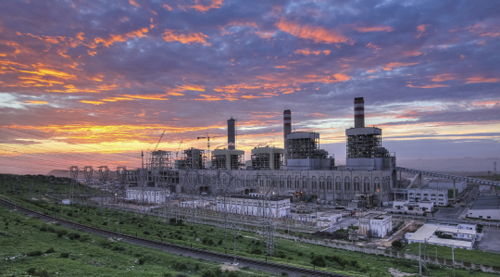Company pushes the diversification of its projects to nuclear power, biogas and oil plants

The Jorf Lasfar thermal power plant project in Morocco, being undertaken by Daewoo E&C.(photo: Daewoo E&C)
Daewoo Engineering and Construction Co. set 8.16 trillion won as this year’s target for securing construction projects both at home and overseas, with the goal of 51 percent from overseas. The company won the Safi Independent Power Project, the biggest project in Morocco involving the construction of a coal-burning thermal power plant and supplementary facilities for 1.971 trillion won on Aug. 9. The project, the biggest so far won by the company overseas, is an EPC-type, which means the builder will take charge of all phases of the projects from design to purchase and construction, the company said on Aug. 12.
The privately-invested thermal power plant will be built on a seaside location some 15km south of Safi with the power generation capacity of 1,320Mw. Daewoo Construction signed the contract with Safi Energy Co. to complete the project in 46 months.
Under the leadership of Park Yong-shik, the new president, the company has managed to tie down 2.23 trillion won in overseas projects, far below the target, but is optimistic that it will have no problems meeting its target because many projects the company has been working to secure are to be ordered in the second half.
Daewoo Construction kicked off its overseas operations in 1976 with a road construction project in Ecuador when the company was part of the now-defunct Daewoo Group. Since then, the company has operated in 44 countries on 410 projects valued at $45.4 billion. The company has been ranked among the top 50 construction firms in the world steadily over the years, according to the ENR, a construction industry publication in the United States.
The company has diversified its construction projects from oil and gas plants to intelligent buildings, hotels (Malaysia, Singapore), container terminals, shipyards (Algeria, Oman, and Qatar), and apartment complexes (Saudi Arabia, Libya). An outstanding example of its diversification is the project in Algeria for the recovery of a stream in downtown Algiers, the capital of the north African country, from pollution with the waste and waste water from factories, earning it the nickname the “Dead River.” Daewoo has to clean the river and make the riverbanks a resting place with facilities for arts and culture for residents of Algiers.
Daewoo Construction has been working on its plans to expand its region of operation from North Africa, Saudi Arabia, the United Arab Emirates, Oman, Morocco, and Malaysia, to the Middle East to Southeast Asia.
Last year, the company won 76 percent of its overseas projects from Africa, or 4.825 trillion won, 11 percent in the Middle East, or 711.5 billion won, and 13 percent in other regions such as Southeast Asia, or 823.9 billion won.
Among the company’s incomplete projects, 52 percent are in Africa, 27 percent are in the Middle East, and 21 percent are in Asia. By project area, its incomplete projects are 33 percent petrochemicals plants, 35 percent power plants, and 32 percent civil engineering, showing strong diversity.
With competition among Korean builders overseas heating up, the upgrading of management of overseas units to an advanced country level has become as important as winning projects. More serious is the fact that overseas operations are not just undertaking building, but have expanded to finance, construction, and management, becoming more complex, and they have been working to adjust to the changing conditions.
The company’s Star Lake City Project, which the company won in Hanoi, Vietnam, last November, involves the construction company taking charge of the financing, construction, and sale of the facilities of the development project, required $2.528 billion in funds. It is the first overseas project in which a Korean builder has taken charge of every aspect of a new city development.
Daewoo Construction also plans to take advantage of its technology accumulated over decades of operations, such as the construction of nuclear power plants, with the company already completing an experimental nuclear power plant in Jordan.
Daewoo is also counting on exporting its DBS (Daewoo biogas system) construction technology, which has been listed as one of the top 10 construction technologies developed by Korean builders. The DBS technology is for the construction of environmentally friendly bio energy plants that burn sludge, animal droppings, and food wastes. Daewoo is aiming at the European biogas market, which is worth 50 trillion won and is currently dominated by German builders.
